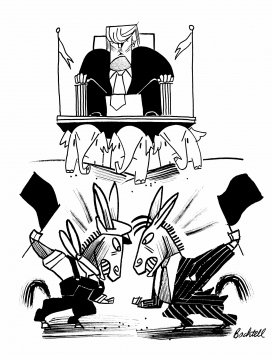 Michael Tomasky in the NYRB:
Michael Tomasky in the NYRB:
At the moment, as the Democrats struggle over their future, one can legitimately wonder whether the poles of the Democratic tent are strong enough to hold. The divisions are stark. This historical moment is often compared to 1972, when a youth movement similar to the one Sanders leads today took over the party and nominated George McGovern. But if anything, today’s divisions run far deeper. Then, the party was split chiefly over the Vietnam War. There were other issues, to be sure, and the New Left—the 1960s movement of student radicals that spread from Madison to Berkeley to everywhere—pressed a broader critique of American society; but McGovern’s was fundamentally an antiwar candidacy. And while the Vietnam debate was shattering to the party for a few years, wars eventually end, as indeed that one did, not long after the 1972 election.
Once it ended, and once the Watergate scandal mushroomed, the party was able to stitch itself back together with surprising ease. In the 1974 midterms, both liberals and moderates were able to run aggressively against Richard Nixon, and the Democrats made historic gains that year. Then, with the country still agitated over Nixon and Gerald Ford’s pardon of him, and with a sunny southern moderate vaulting over several better-known and more liberal senators, they recaptured the White House in 1976.
The current divide is not about one war. It is about capitalism—whether it can be reformed and remade to create the kind of broad prosperity the country once knew, but without the sexism and racism of the postwar period, as liberals hope; or whether corporate power is now so great that we are simply beyond that, as the younger socialists would argue, and more radical surgery is called for.
More here.
